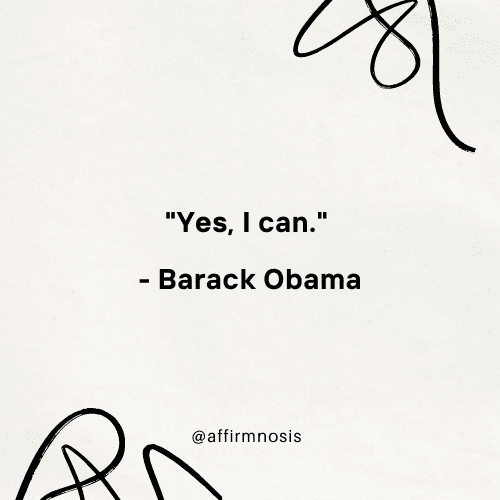The power of words is well-established in psychology and personal development. Words can influence our thoughts, emotions, behavior, and ultimately shape our reality.
One way to harness the power of positive words is through affirmations. Affirmations are statements that we repeat to ourselves, with the intention of creating positive change in our lives.
The Power of Short Positive Affirmations
Positive affirmations are simple but powerful tools that can help us reprogram our subconscious mind. Our subconscious mind is like a tape recorder that stores all our beliefs, experiences, and memories. These beliefs and memories shape our thoughts and behavior.
Affirmations work by replacing negative or limiting beliefs with positive ones. When we repeat affirmations regularly, they become embedded in our subconscious mind and start to influence the way we think and feel about ourselves.
Importance of Short Positive Affirmations
Short positive affirmations are important because they are easy to remember, quick to repeat, and can be used anytime throughout the day. Unlike longer affirmations that may require more effort to remember or recite, short affirmations can be used as a quick pick-me-up during stressful situations or when feeling down.
Short affirmations also tend to focus on one specific aspect of life or belief at a time. This makes them more effective at addressing specific issues or challenges we may be facing in life.
Benefits of Using Short Positive Affirmations
There are numerous benefits to using short positive affirmations regularly. Some benefits include:
- Boosting self-confidence: repeating affirming statements about oneself helps to build self-esteem and confidence.
- Reducing stress: using short positive affirmations during moments of stress can help calm the mind and reduce anxiety.
- Increasing positivity: regularly using affirmations can help shift our focus towards positive thinking, leading to a more positive outlook on life.
- Achieving goals: by repeating affirmations related to specific goals or desires, we can stay focused and motivated towards achieving them.
Incorporating short positive affirmations into our daily routine can have a significant impact on our mental and emotional well-being. The next sections will explore in depth the power of words, crafting effective affirmations, how to integrate affirmations into daily life and overcome resistance or negative self-talk when using them.
The Power of Words

How Words Affect Our Thoughts and Emotions
Words are powerful. They have the ability to shape how we think, feel, and behave. The words we use when talking to ourselves or others can make a significant impact on our mindset and overall well-being.
Negative self-talk, for example, can lead to feelings of anxiety, depression, and low self-esteem. On the other hand, positive affirmations can help us cultivate a more optimistic outlook on life.
When we repeat positive statements to ourselves regularly, it can help us shift our thoughts from negative to positive and improve our mood. For instance, saying “I am strong” repeatedly can help you feel empowered when facing challenges.
The Science Behind the Power of Affirmations
The power of affirmations is not just anecdotal; there is scientific evidence supporting its effectiveness. In a study conducted by the University of Arizona in 2010, researchers found that daily affirmations led to improvements in mental health-related outcomes such as increased self-esteem and decreased distress. Another theory that supports the power of affirmations is cognitive dissonance theory.
This theory suggests that we experience discomfort when our beliefs do not align with our actions or experiences. Positive affirmations help shift our beliefs so they align more closely with our desired outcomes.
Examples of How Words Can Change Our Mindset
Words have the power to change how we think about ourselves and our circumstances. For example:
– Instead of saying “I’m not good enough,” try saying “I am worthy.” – Instead of saying “I’m a failure,” try saying “I am capable.”
– Instead of saying “I’ll never be successful,” try saying “I will achieve my goals.” These simple changes in phrasing can make a big difference in how you perceive yourself and your abilities.
The Benefits of Using Short Positive Affirmations
The benefits of using short positive affirmations go beyond just improving your mood. Here are some additional benefits:
– Increased self-awareness – Improved self-esteem
– Reduced stress and anxiety – Enhanced creativity and problem-solving skills
Overall, incorporating short positive affirmations into your daily routine can have a significant impact on your well-being. The power of words is not to be underestimated, and by choosing to use positive language, you can change how you think, feel, and act.
Crafting Short Positive Affirmations
Tips for creating effective affirmations
Creating effective affirmations is a simple process but requires careful thought and consideration. Firstly, it’s important to frame the affirmation in a positive manner, focusing on what you want rather than what you don’t want. For example, instead of saying “I am not lazy,” rephrase it as “I am productive and motivated.” Secondly, affirmations should be written in the present tense as if they are already true.
This helps to reinforce the belief that what you desire is already happening. Make sure your affirmation is specific and realistic, so it feels achievable.
Examples of short positive affirmations for various areas of life (e.g., self-love, success, relationships)
Short positive affirmations can work wonders for different areas of life such as self-love, success, and relationships. Here are some examples:
Self-love: – I love myself unconditionally
– I am worthy of love and respect – My body is beautiful just the way it is
Success: – I have everything I need to succeed
– Success comes easily and naturally to me – Every day I am getting closer to achieving my goals
Relationships: – My relationships are healthy and fulfilling
– I attract loving and supportive people into my life – My partner loves me deeply
How to personalize affirmations to fit individual needs
Personalizing your affirmation can make it more powerful by targeting specific areas that require improvement or attention. A good starting point is identifying negative beliefs or patterns that are holding you back from achieving your goals.
For example, if you struggle with public speaking but want to improve your skills, an affirmation could be: “I confidently speak in front of large audiences with ease.” To make your affirmation more personalized think about what qualities you need to cultivate within yourself to achieve your desired outcome.
You can also consider including personalized details like names, places, or objects that hold significance to you. Crafting short positive affirmations requires thought and focus.
It’s important to frame the affirmation positively, write it in the present tense and make it specific. Examples of affirmations for different areas of life can be a great starting point for creating your own personalized affirmations.
Remember that personalizing your affirmation is key to making it more powerful and effective in achieving your desired goals. Practice saying them regularly with conviction and belief and watch as they transform your life.
Incorporating Short Positive Affirmations into Daily Life
The key to making affirmations a part of your daily routine is finding ways to incorporate them seamlessly into your existing habits. For example, you could repeat affirmations while brushing your teeth or getting dressed in the morning.
Ways to Integrate Affirmations into Daily Routine
Alternatively, you might choose to incorporate affirmations during meditation or while doing yoga. Another way to integrate affirmations is by creating visual reminders of your chosen phrases.
You might write out an affirmation on a sticky note and place it on your computer screen or mirror, where you’ll see it multiple times each day. Or consider using a visualization board or vision journal as a way to regularly visualize and reinforce your positive intentions.
Importance of Repetition and Consistency in Using Affirmations
Repetition is key when it comes to using affirmations effectively. By repeating the same phrase over and over again, you can begin to create new neural pathways in the brain that support positive self-talk and mindset shifts.
However, repetition alone isn’t enough – the consistency with which you practice affirmations also plays an important role. To get the most out of affirmations, commit to practicing them daily or multiple times per day for at least several weeks.
Set aside dedicated time each day for affirmation practice, such as during meditation or journaling sessions. The more consistently you practice, the more likely you are to experience long-term benefits from incorporating short positive affirmations into your daily life.
Overcoming Resistance or Negative Self-Talk When Using Affirmations
As with any habit change, incorporating short positive affirmations can come with its own set of challenges. One common obstacle is resistance – that nagging voice inside that tells us we’re not good enough or don’t deserve positivity in our lives.
To overcome resistance, it can be helpful to reframe affirmations as statements of fact rather than wishful thinking. Another challenge is negative self-talk that contradicts the positive affirmations we’re trying to adopt.
When this happens, it’s important to acknowledge the negative thoughts without judgment and then redirect our focus back to the affirmation. For example, if you’re practicing an affirmation like “I am worthy of love and respect,” and a negative thought pops up that says “No one could ever truly love me,” acknowledge the thought and then return to repeating the original affirmation.
Incorporating short positive affirmations into daily life can be a powerful tool for shifting mindset and improving overall well-being. By finding ways to seamlessly integrate affirmations into your existing routines, repeating them consistently over time, and overcoming resistance or negative self-talk that arises along the way, you can begin to reap the many benefits of this simple but effective practice.
Whether you’re seeking greater self-love, increased success at work or in relationships, or simply a more positive outlook on life, incorporating short positive affirmations into your daily routine is a small but powerful step towards achieving those goals.
Conclusion:
Short positive affirmations have the power to change our thoughts and emotions, ultimately impacting our overall well-being. By choosing to focus on positive self-talk and using affirmations regularly, we can transform our mindset and achieve a more fulfilling life.
Throughout this article, we delved into the science behind affirmations and how they work to change the neural pathways in our brains.
We also explored practical tips for crafting effective affirmations that are personalized to individual needs. Using short positive affirmations doesn’t require hours of meditation or complicated rituals.
It can be as simple as starting each day with a few minutes of intentional self-talk or incorporating them into daily routines such as exercising or getting ready for bed. Consistency is key in order to see results.
The benefits of using short positive affirmations are endless – increased self-esteem, motivation, resilience, and reduced anxiety just to name a few. They provide us with a powerful tool for managing negative self-talk and overcoming limiting beliefs.
Incorporating short positive affirmations into daily life is an easy but transformative practice that anyone can do regardless of their beliefs or background. We encourage you to give it a try and see how it can positively impact your wellbeing in meaningful ways!
Short positive quotes & affirmations from notable individuals
- “Believe you can and you’re halfway there.” – Theodore Roosevelt
- “The only limit to our realization of tomorrow will be our doubts of today.” – Franklin D. Roosevelt
- “The mind is everything. What you think you become.” – Buddha
- “You are never too old to set another goal or to dream a new dream.” – C.S. Lewis
- “Believe in yourself! Have faith in your abilities! Without a humble but reasonable confidence in your own powers, you cannot be successful or happy.” – Norman Vincent Peale
- “The only way to achieve the impossible is to believe it is possible.” – Charles Kingsleigh
- “You have power over your mind – not outside events. Realize this, and you will find strength.” – Marcus Aurelius
- “The future belongs to those who believe in the beauty of their dreams.” – Eleanor Roosevelt
- “Whatever we plant in our subconscious mind and nourish with repetition and emotion will one day become a reality.” – Earl Nightingale
- “The only thing standing between you and your goal is the story you keep telling yourself as to why you can’t achieve it.” – Jordan Belfort
- “Yes, I can.” – Barack Obama
- “I am the greatest, I said that even before I knew I was.” – Muhammad Ali
- “Believe you can and you’re halfway there.” – Theodore Roosevelt
- “I am in charge of how I feel and today I am choosing happiness.” – Unknown
- “I can and I will. Watch me.” – Carrie Green
- “Every day in every way I’m getting better and better.” – Émile Coué
- “I am thankful for a lawn that needs mowing, windows that need cleaning and gutters that need fixing because it means I have a home…. I am thankful for the piles of laundry and ironing because it means my loved ones are nearby.” – Nancie J. Carmody
- “I am not a product of my circumstances. I am a product of my decisions.” – Stephen Covey
- “I am not what happened to me, I am what I choose to become.” – Carl Jung
- “I am the master of my fate, I am the captain of my soul.” – William Ernest Henley
These quotes emphasize the power of positive thinking, self-belief, and the potential for self-improvement and change through practices like using positive affirmations.




























































